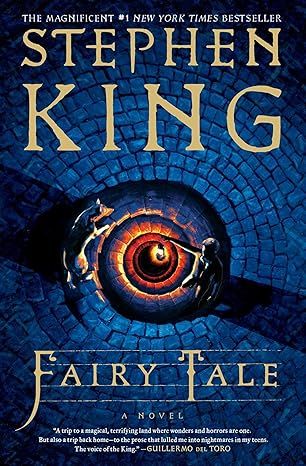Fairy Tale
4.6
-
64,983 ratings
A #1 New York Times Bestseller and New York Times Book Review Editors’ Choice!
Legendary storyteller Stephen King goes into the deepest well of his imagination in this spellbinding novel about a seventeen-year-old boy who inherits the keys to a parallel world where good and evil are at war, and the stakes could not be higher—for that world or ours.
Charlie Reade looks like a regular high school kid, great at baseball and football, a decent student. But he carries a heavy load. His mom was killed in a horrific accident when he was seven, and grief drove his dad to drink. Charlie learned how to take care of himself—and his dad. When Charlie is seventeen, he meets a dog named Radar and her aging master, Howard Bowditch, a recluse in a big house at the top of a big hill, with a locked shed in the backyard. Sometimes strange sounds emerge from it.
Charlie starts doing jobs for Mr. Bowditch and loses his heart to Radar. Then, when Bowditch dies, he leaves Charlie a cassette tape telling a story no one would believe. What Bowditch knows, and has kept secret all his long life, is that inside the shed is a portal to another world.
Magnificent, terrifying, and “spellbinding…packed with glorious flights of imagination and characteristic tenderness about childhood, Fairy Tale is vintage King at his finest” (Esquire).
“Good, evil, a kingdom to save, monsters to slay—these are the stuff that page-turners are made from.” —Laura Miller, Slate
Kindle
$9.99
Available instantly
Audiobook
$0.00
with membership trial
Hardcover
$16.25
Paperback
$13.02
Ships from
Amazon.com
Payment
Secure transaction
ISBN-10
1668002191
ISBN-13
978-1668002193
Print length
624 pages
Language
English
Publisher
Scribner
Publication date
June 05, 2023
Dimensions
5.5 x 1.7 x 8.38 inches
Item weight
1.05 pounds
Popular highlights in this book
Here is something I learned in Empis: good people shine brighter in dark times.
Highlighted by 229 Kindle readers
‘There’s always someone at fault,’ Dad said. ‘Which is not the same as blame.’
Highlighted by 212 Kindle readers
Child Roland to the dark tower came, His word was still Fie, foh, and fum, I smell the blood of a British man.
Highlighted by 178 Kindle readers
Product details
ASIN :
B09QXZB6SK
File size :
37269 KB
Text-to-speech :
Enabled
Screen reader :
Supported
Enhanced typesetting :
Enabled
X-Ray :
Not Enabled
Word wise :
Enabled
Editorial reviews
Praise for Fairy Tale
“I read (in one long, long sitting) Stephen King's fabulous Fairy Tale and it was just such a trip! A trip to a magical, terrifying land where wonders and horrors are one. But also a trip back home- to that prose that lulled me into nightmares in my teens. The voice of the King.” —Guillermo del Toro
“Stephen King has all the daring, enchantment and even romance of a classic bedtime story, but King's signature unsettling style will keep you sitting up straight and wide-eyed rather than drifting off to dreamland.” —Vanity Fair
“You’ll be grateful that there are 600-plus pages of it to remind you several times over how much fun that kind of reading experience is... Good, evil, a kingdom to save, monsters to slay—these are the stuff that page-turners are made from." —Laura Miller, Slate
“A page-turner driven by memorably strange encounters and well-rendered, often thrilling action.” —The New York Times Book Review
“An enthralling, adventurous read that will, like any genuine fairy tale, scare you half to death and lift up your heart… A splendid work of world-building.” —Colette Bancroft, The Tampa Bay Tribune
“Once upon a time, Stephen King dared to write a novel called ‘Fairy Tale’ and totally lived up to that simple but lofty title… The book bursts with creativity… A profound story of good vs. evil that’s timeless and timely… life-affirming… After turning that last page, you’ll feel a little stronger in spirit, yearn for another story and, dare we say, maybe even live happily ever after.” —Brian Truitt, USA Today
“Lovely… captures the creeping suspense of childhood classics.” — The Chicago Tribune
“If writing this beautiful, exciting, touching fairy tale did the trick for him, then imagine what it will do for you as a reader.” —Emily Burnham, Bangor Daily News
“Ambitious, pure, and powerful… One of King's grandest narrative statements, and another must-read book from a master.” —Matthew Jackson, Syfy Wire
Read more
Sample
Chapter One: The Goddam Bridge. The Miracle. The Howling.
1
I’m sure I can tell this story. I’m also sure no one will believe it. That’s fine with me. Telling it will be enough. My problem—and I’m sure many writers have it, not just newbies like me—is deciding where to start.
My first thought was with the shed, because that’s where my adventures really began, but then I realized I would have to tell about Mr. Bowditch first, and how we became close. Only that never would have happened except for the miracle that happened to my father. A very ordinary miracle you could say, one that’s happened to many thousands of men and women since 1935, but it seemed like a miracle to a kid.
Only that isn’t the right place, either, because I don’t think my father would have needed a miracle if it hadn’t been for that goddamned bridge. So that’s where I need to start, with the goddamned Sycamore Street Bridge. And now, thinking of those things, I see a clear thread leading up through the years to Mr. Bowditch and the padlocked shed behind his ramshackle old Victorian.
But a thread is easy to break. So not a thread but a chain. A strong one. And I was the kid with the shackle clamped around his wrist.
2
The Little Rumple River runs through the north end of Sentry’s Rest (known to the locals as Sentry), and until the year 1996, the year I was born, it was spanned by a wooden bridge. That was the year the state inspectors from the Department of Highway Transportation looked it over and deemed it unsafe. People in our part of Sentry had known that since ’82, my father said. The bridge was posted for ten thousand pounds, but townies with a fully loaded pickup truck mostly steered clear of it, opting for the turnpike extension, which was an annoying and time-consuming detour. My dad said you could feel the planks shiver and shake and rumble under you even in a car. It was dangerous, the state inspectors were right about that, but here’s the irony: if the old wooden bridge had never been replaced by one made of steel, my mother might still be alive.
The Little Rumple really is little, and putting up the new bridge didn’t take long. The wooden span was demolished and the new one was opened to traffic in April of 1997.
“The mayor cut a ribbon, Father Coughlin blessed the goddam thing, and that was that,” my father said one night. He was pretty drunk at the time. “Wasn’t much of a blessing for us, Charlie, was it?”
It was named the Frank Ellsworth Bridge, after a hometown hero who died in Vietnam, but the locals just called it the Sycamore Street Bridge. Sycamore Street was paved nice and smooth on both sides, but the bridge deck—one hundred and forty-two feet long—was steel grating that made a humming sound when cars went over it and a rumble when trucks used it—which they could do, because the bridge was now rated at sixty thousand pounds. Not big enough for a loaded semi, but long-haulers never used Sycamore Street, anyway.
There was talk every year in the town council about paving the deck and adding at least one sidewalk, but every year it seemed like there were other places where the money was needed more urgently. I don’t think a sidewalk would have saved my mother, but paving might have. There’s no way to know, is there?
That goddam bridge.
3
We lived halfway up the long length of Sycamore Street Hill, about a quarter of a mile from the bridge. There was a little gas-and-convenience store on the other side called Zip Mart. It sold all the usual stuff, from motor oil to Wonder Bread to Little Debbie cakes, but it also sold fried chicken made by the proprietor, Mr. Eliades (known to the neighborhood as Mr. Zippy). That chicken was exactly what the sign in the window said: THE BEST IN THE LAND. I can still remember how tasty it was, but I never ate a single piece after my mom died. I would have gagged it up if I tried.
One Saturday in November of 2003—the town council still discussing paving the bridge and still deciding it could wait another year—my mother told us she was going to walk down to the Zippy and get us fried chicken for dinner. My father and I were watching a college football game.
“You should take the car,” Dad said. “It’s going to rain.”
“I need the exercise,” Mom said, “but I’ll wear my Little Red Riding Hood raincoat.”
And that’s what she was wearing the last time I saw her. The hood wasn’t up because it wasn’t raining yet, so her hair was spilling over her shoulders. I was seven years old, and thought my mother had the world’s most beautiful red hair. She saw me looking at her through the window and waved. I waved back, then turned my attention to the TV, where LSU was driving. I wish I had looked longer, but I don’t blame myself. You never know where the trapdoors are in your life, do you?
It wasn’t my fault, and it wasn’t Dad’s fault, although I know he blamed himself, thought if only I’d gotten up off my dead ass and given her a ride to the damn store. It probably wasn’t the fault of the man in the plumbing truck, either. The cops said he was sober, and he swore he was keeping to the speed limit, which was 25 in our residential zone. Dad said that even if that were true, the man must have taken his eyes off the road, if only for a few seconds. Dad was probably right about that. He was an insurance claims adjuster, and he told me once that the only pure accident he ever heard of was a man in Arizona who was killed when a meteor hit him in the head.
“There’s always someone at fault,” Dad said. “Which is not the same as blame.”
“Do you blame the man who hit Mom?” I asked.
He thought about it. Raised his glass to his lips and drank. This was six or eight months after Mom died, and he’d pretty much given up on beer. By then he was strictly a Gilbey’s man.
“I try not to. And mostly I can do that unless I wake up at two in the morning with nobody in the bed but me. Then I blame him.”
4
Mom walked down the hill. There was a sign where the sidewalk ended. She walked past the sign and crossed the bridge. By then it was getting dark and starting to drizzle. She went into the store, and Irina Eliades (of course known as Mrs. Zippy) told her more chicken was coming out in three minutes, five at the most. Somewhere on Pine Street, not far from our house, the plumber had just finished his last job of that Saturday and was putting his toolbox in the back of his panel van.
The chicken came out, hot and crispy and golden. Mrs. Zippy boxed up an eight-piece and gave Mom an extra wing to eat on her walk home. Mom thanked her, paid, and stopped to look at the magazine rack. If she hadn’t done that, she might have made it all the way across the bridge—who knows? The plumber’s van must have been turning onto Sycamore Street and starting down the mile-long hill while Mom was checking out the latest issue of People.
She put it back, opened the door, and spoke to Mrs. Zippy over her shoulder: “Have a nice night.” She might have cried out when she saw the van was going to hit her, and God knows what she might have been thinking, but those were the last words she ever spoke. She went out. The rain was coming down cold and steady by then, silvery lines in the glow of the one streetlight on the Zip Mart side of the bridge.
Munching on her chicken wing, my mother walked onto the steel deck. Headlights picked her out and threw her shadow long behind her. The plumber passed the sign on the other side, the one that reads BRIDGE SURFACE FREEZES BEFORE ROAD! PLEASE USE CAUTION! Was he looking in his rearview mirror? Maybe checking for messages on his phone? He said no to both, but when I think of what happened to her that night, I always think of my dad saying the only pure accident he ever heard of was the man who took a meteor to the head.
There was plenty of room; the steel bridge was quite a bit wider than the wooden version had been. The problem was that steel grating. He saw my mother halfway across the bridge and hit the brake, not because he was speeding (or so he said) but out of pure instinct. The steel surface had started to freeze. The panel truck skidded and slued, starting to come sideways. My mother shrank against the bridge rail, dropping her little piece of chicken. The panel truck slued further, struck her, and sent her spinning along the rail like a top. I don’t want to think about the parts of her that were torn off in that death-spin, but I’m helpless not to sometimes. All I know is that the nose of the panel truck finally drove her into a bridge stanchion near the Zip Mart side of the bridge. Part of her went into the Little Rumple. Most of her stayed on the bridge.
I carry a picture of us in my wallet. I was maybe three when it was taken. She’s got me on her hip. One of my hands is in her hair. She had beautiful hair.
5
Shitty Christmas that year. You better believe it.
I remember the reception after the funeral. It was at our house. My father was there, greeting people and accepting condolences, and then he was gone. I asked his brother, my Uncle Bob, where he was. “He had to lie down,” Uncle Bob said. “He was really worn out, Charlie. Why don’t you go outside and play?”
I had never felt less like playing in my life, but I went outside. I passed a bunch of grownups who had come outside to smoke and I heard one of them say poor guy, drunk as a skunk. Even then, deep in grief for my mother, I knew who they were talking about.
Before Mom died, my father was what I’d call “a regular drinker.” I was just a little kid in the second grade, so I suppose you have to take that with a grain of salt, but I stand by it. I never heard him slurring, he didn’t stumble around the place, he didn’t go out to bars, and he never laid a hand on me or my mother. He would come home with his briefcase and Mom would give him a drink, usually a martini. She’d have one, too. In the evening, while we were watching TV, he might have a couple of beers. That was it.
All that changed after the goddam bridge. He was drunk after the funeral (as a skunk), drunk on Christmas, and drunk on New Year’s Eve (which, I found out later, people like him call Amateur Night). In the weeks and months after we lost her, he was drunk most of the time. Mostly at home. He still didn’t go out to bars at night (“Too many assholes like me,” he said once), and he still never laid a hand on me, but the booze was out of control. I know that now; then I just accepted it. Kids do that. Dogs, too.
I found myself getting my own breakfast two mornings a week, then four, then almost all the time. I’d eat Alpha-Bits or Apple Jacks in the kitchen and hear him snoring in the bedroom—great big motorboat snores. Sometimes he forgot to shave before leaving for work. After dinner (more and more that was take-out), I’d hide his car keys. If he needed a fresh bottle, he could walk down to the Zippy and get one. Sometimes I worried about him meeting a car on the goddam bridge, but not too much. I was sure (pretty sure, at least) that both of my parents couldn’t possibly get wiped out in the same place. My dad worked in insurance, and I knew what actuarial tables were: figuring the odds.
He was good at his job, my dad, and he skated along for over three years in spite of his boozing. Did he get warnings at work? I don’t know, but probably. Was he pulled over for driving erratically, once the drinking started in the afternoon? If he was, maybe he was let off with a warning. Make that probably, because he knew all the cops in town. Dealing with cops was part of his job.
There was a rhythm to our lives during those three years. Maybe not a good rhythm, not the sort you’d want to dance to, but one I could count on. I’d get home from school around three. My father would roll in around five, with a few drinks already under his belt and on his breath (he didn’t go out to the bars at night, but I found out later he was a regular at Duffy’s Tavern on his way home from the office). He’d bring a pizza, or tacos, or Chinese from Joy Fun. Some nights he’d forget and we’d order out… or rather, I would. And after dinner the real drinking would start. Mostly gin. Other stuff if the gin was gone. Some nights he fell asleep in front of the TV. Some nights he’d stumble into the bedroom, leaving his shoes and rumpled suitcoat for me to put away. Once in awhile I’d wake up and hear him crying. It’s pretty awful to hear that in the middle of the night.
The crash came in 2006. It was summer vacation. I had a Shrimp League game at ten in the morning—hit two home runs and made an awesome catch. I came home just after noon and found my father already there, sitting in his chair and staring at the TV, where old-time movie stars were having a duel on some castle stairs. He was in his undershorts and sipping a white drink that smelled to me like straight Gilbey’s. I asked him what he was doing home.
Still looking at the swordfight and hardly slurring at all, he said: “I seem to have lost my job, Charlie. Or, if I can quote Bobcat Goldthwait, I know where it is, but someone else is doing it. Or soon will be.”
I thought I didn’t know what to say, but words came out of my mouth anyway. “Because of your drinking.”
“I’m going to stop,” he said.
I just pointed at the glass. Then I went into my bedroom and shut the door and started to cry.
He knocked on my door. “Can I come in?”
I didn’t answer. I didn’t want him to hear me blubbing.
“Come on, Charlie. I poured it down the sink.”
Like I didn’t know the rest of the bottle would be on the kitchen counter. And another one in the liquor cabinet. Or two. Or three.
“Come on, Charlie, what do you say?” Shay. I hated the slur in his voice.
“Fuck you, Dad.”
I’d never said such a thing to him in my life, and I sort of wanted him to come in and give me a slap. Or a hug. Something, anyway. Instead I heard him shuffle into the kitchen, where the bottle of Gilbey’s would be waiting.
He was asleep on the couch when I finally came out. The TV was still on, but muted. It was some other black-and-white movie, this one featuring old cars racing around what was obviously a movie set. Dad always watched TCM when he was drinking, unless I was home and insisted on something else. The bottle was on the coffee table, mostly empty. I poured what was left down the sink. I opened the liquor cabinet and thought about pouring away everything else, but looking at the gin, the whiskey, the vodka nips, the coffee brandy—that just made me tired. You wouldn’t think a ten-year-old could be tired like that, but I was.
I put a Stouffer’s frozen dinner in the microwave for supper—Grandma’s Chicken Bake, our favorite—and shook him awake while it was cooking. He sat up, looked around like he didn’t know where he was, then started to make these horrible chugging sounds I’d never heard before. He wove his way to the bathroom with his hands over his mouth and I heard him puking. It seemed to me like it would never stop, but eventually it did. The microwave binged. I got the Chicken Bake out, using the oven mitts that said GOOD COOKIN’ on the left and GOOD EATIN’ on the right—you forget to use those mitts once while you’re taking something hot out of the zapper and you never forget again. I blopped some on our plates and then went into the living room, where Dad was sitting on the couch with his head down and his hands laced together on the back of his neck.
“Can you eat?”
He looked up. “Maybe. If you bring me a couple of aspirin.”
The bathroom stank of gin and something else, maybe bean dip, but at least he’d gotten all of it in the bowl and flushed it away. I sprayed some Glade around, then brought him the aspirin bottle and a glass of water. He took three and put the glass where the bottle of Gilbey’s had been. He looked up at me with an expression I’d never seen before, even after Mom died. I hate to say this, but I’m going to because it’s what I thought then: it was the expression of a dog that has taken a shit on the floor.
“I could eat if you gave me a hug.”
I hugged him and said I was sorry for what I said.
“It’s okay. Probably I deserved it.”
We went into the kitchen and ate as much of Grandma’s Chicken Bake as we could manage, which wasn’t very much. As he scraped our plates into the sink, he told me he was going to stop drinking, and that weekend he did. He told me that on Monday he was going to start looking for a job, but he didn’t. He stayed home, watched old movies on TCM, and when I came home from baseball practice and noon swim at the Y, he was pretty much blotto.
He saw me looking at him and just shook his head. “Tomorrow. Tomorrow. I absolutely promise.”
“I call bullshit,” I said, and went into my room.
Read more
About the authors
Stephen King
Stephen King is the author of more than fifty books, all of them worldwide bestsellers. His first crime thriller featuring Bill Hodges, MR MERCEDES, won the Edgar Award for best novel and was shortlisted for the CWA Gold Dagger Award. Both MR MERCEDES and END OF WATCH received the Goodreads Choice Award for the Best Mystery and Thriller of 2014 and 2016 respectively.
King co-wrote the bestselling novel Sleeping Beauties with his son Owen King, and many of King's books have been turned into celebrated films and television series including The Shawshank Redemption, Gerald's Game and It.
King was the recipient of America's prestigious 2014 National Medal of Arts and the 2003 National Book Foundation Medal for distinguished contribution to American Letters. In 2007 he also won the Grand Master Award from the Mystery Writers of America. He lives with his wife Tabitha King in Maine.
Read more
Reviews
Customer reviews
4.6 out of 5
64,983 global ratings
PrivateShopper
5
Not at all what I expected
Reviewed in the United States on August 10, 2024
Verified Purchase
I am not, in the grand scheme of things, what anyone might call a big Stephen King fan. I have enjoyed a few of his works, appreciate his skill and talent, but overall, I prefer my fantasy reading of a lighter sort. However, I came across a book deal on this one and thought the premise sounded interesting and decided to give it a try. It was not at all what I expected, but I loved it anyway. Not in the way that perhaps I will go back and re-read it over and over again, but in the way where a story you read stays with you long after you’ve closed its pages, and you think of it fondly at random times for years and years later. I started by listening to the book through Audible (the narration was wonderful and “made” a big part of why I loved this so much), and became so enamored I went ahead and purchased the kindle version so I could surreptitiously read it anytime I had a free moment because I was in such a hurry to finish the story. I fell in love with Charlie, with Howard, with Dora, Woody, and most importantly, with Radar. I stopped the book only once, and committed the “sin” of googling a synopsis online to make sure that the one thing I feared did not come to pass in this book, because I was afraid my heart couldn’t take it. It didn’t, or so the summary said, and I progressed on, only to be sad when I reached the end that it was over so quickly. So, if you are like me, looking for something unexpected, an atypical fantasy- a little dark, perhaps, but not deeply or horrifically so- with flawed characters you cannot help but love, a book which reminds you both of all of the best of your childhood fantasies and the bittersweet tang of growing up, I encourage you to give this book (and its audible version) a try. I will give only one note, to those like me who might otherwise be afraid to read it without it— SPOILER ALERT*
(The dog does NOT die.)
Read more
7 people found this helpful
Stan
5
Not your normal King but, nonetheless, still a great story.
Reviewed in the United States on September 19, 2024
Verified Purchase
This is not King as a horror writer but King as a fantasy writer just like in Eyes of the Dragon.
And just like that novel and all his others, King shows his masterful storytelling talent in this fantasy filled, magical world book.
Even though the build up took some time, it was well worth it because it got you more invested in Charlie's character. And once things started rolling, concerns for Charlie and what happened to him increased. It got to the point that I kept on wanting to read on to see what happened next. And then when I got near the end, I wanted it to keep going.
Yes, this is not King's normal genre, but if you appreciate good stories it does not matter who the writer is and this was a great story.
Enjoy!
Read more
2 people found this helpful
GJ
5
Vintage Stephen King!
Reviewed in the United States on September 20, 2024
Verified Purchase
Back in the '80's I read Salem's Lot. I loved it. Could not put it down. Then Needful Things. As life got busier and I got older I quit reading as much non-fiction, but have always missed it. Now, in my mid 60's and with time on my hands, I decided to pick up King's Fairy Tale. Let me tell you I was NOT disappointed. I feel it is a story of epic magnitude and the 600 pages whizzed by. The characters are unforgettable and the relationship of a boy and his dog, as told by Mr. King, brought tears to my eyes more than once. You will not be sorry for the time invested in this read.
Read more
Top Stephen King titles
View all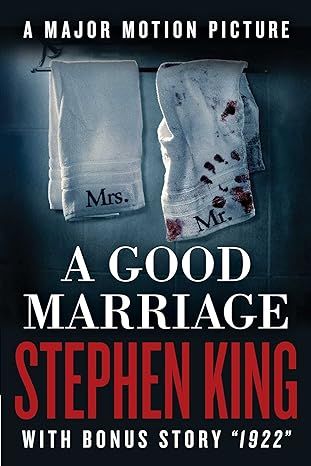
A Good Marriage
4.1
-
5,995
$4.99
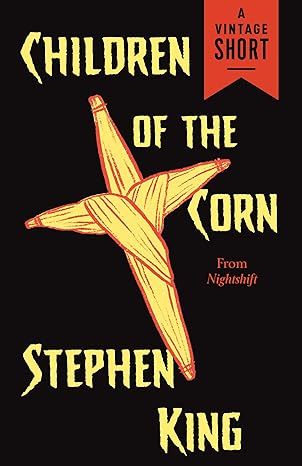
Children of the Corn (Kindle Single) (A Vintage Short)
4.3
-
1,084
$0.99
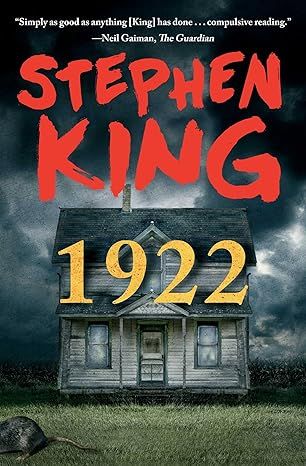
1922
4.6
-
6,082
$7.99
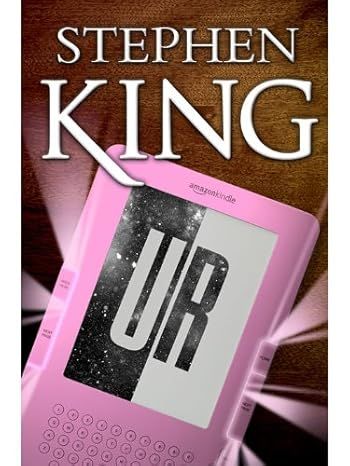
UR
4.3
-
6,140
$3.99
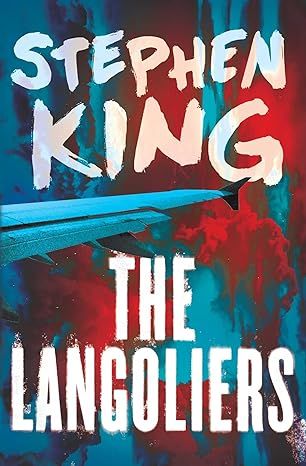
The Langoliers
4.6
-
1,014
$6.49
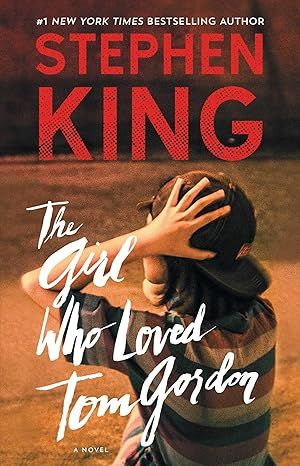
The Girl Who Loved Tom Gordon: A Novel
4.5
-
4,774
$1.17
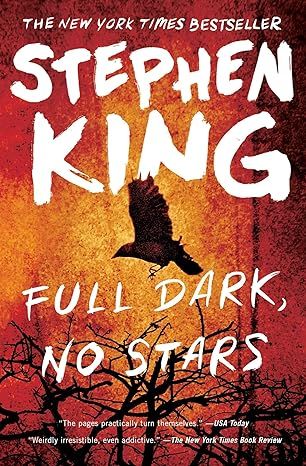
Full Dark, No Stars
4.6
-
6,762
$5.00
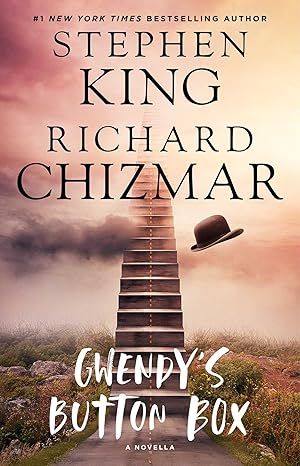
Gwendy's Button Box: A Novella (Gwendy's Button Box Trilogy Book 1)
4.5
-
21,335
$3.88
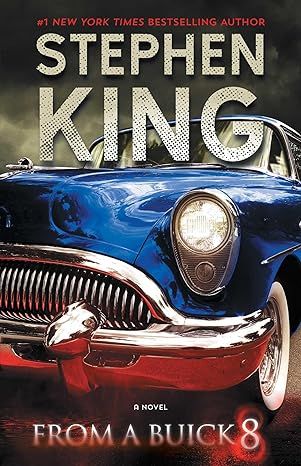
From a Buick 8: A Novel
4.3
-
2,174
$11.99
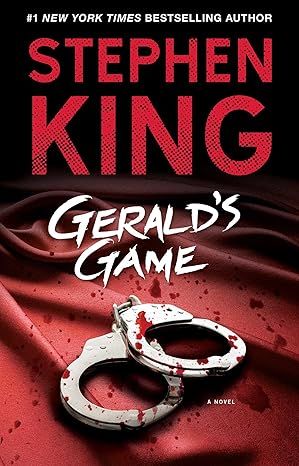
Gerald's Game
4.2
-
3,838
$1.97
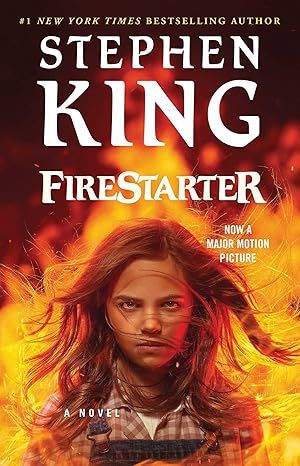
Firestarter
4.6
-
5,489
$9.99
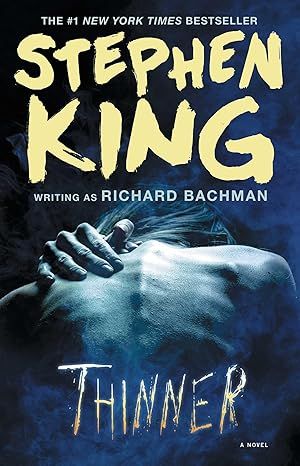
Thinner
4.5
-
3,107
$2.50
Similar Books
Best sellers
View all
The Tuscan Child
4.2
-
100,022
$8.39

The Thursday Murder Club: A Novel (A Thursday Murder Club Mystery)
4.3
-
155,575
$6.33

Sapiens: A Brief History of Humankind
4.6
-
140,302
$13.49

The Butterfly Garden (The Collector, 1)
4.3
-
88,556
$9.59

Things We Hide from the Light (Knockemout Series, 2)
4.4
-
94,890
$11.66

The Last Thing He Told Me: A Novel
4.3
-
154,085
$2.99

The Perfect Marriage: A Completely Gripping Psychological Suspense
4.3
-
143,196
$9.47

The Coworker
4.1
-
80,003
$13.48

First Lie Wins: A Novel (Random House Large Print)
4.3
-
54,062
$14.99

Mile High (Windy City Series Book 1)
4.4
-
59,745
$16.19

Layla
4.2
-
107,613
$8.99

The Locked Door
4.4
-
94,673
$8.53
